六年级英语上册期末总复习
期末复习(讲义)译林版英语六年级上册

六年级上册期末复习一、时态复习1.一般现在时定义:经常发生的动作或现在的状态结构:主语+be/主语+动词注意:第三人称单数be动词用is,动词+s/es否定:主语+be+not 或主语+don't/doesn’t+doShe is=She’s He is=He’s I am=I’m We are=We’reis not=isn't are not=aren't am not不能缩写一般疑问句:①有be动词的情况下将be动词提前②动词用助动词do/does提问注意:改为一般疑问句时,第一人称要改为第二人称时间状语:never、seldom、sometimes、usually、often、always例:①My mother often goes shopping.→改为否定句:My mother often doesn't go shopping.→改为一般疑问句:Does your mother often go shopping?②I get up at 7 o'clock every day.→改为否定句:I don't get up at 7 o'clock every day.→改为一般疑问句:Do you get up at 7 o'clock every day?③Millie is a student.→改为否定句:Millie isn't a student.→改为一般疑问句:is Millie a student?2.现在进行时定义:现在正在做或正在发生的动作结构:is/am/are+doing否定:isn't/aren’t/am not+doing时间状语:Look!Listen!now、There be...over there、where is/are sb.?例:③Look!The girl is dancing.→改为否定句:Look!The girl isn’t dancing.②——Where’s mom, Dad?——Maybe she is cooking dinner in the kitchen.3.一般过去时定义:过去某个时间点发生的动作结构:主语+was/were 或主语+动词过去式否定:主语+was not/were not=主语+wasn't/weren’t 或主语+didn't+do 一般疑问句:①有be动词的情况下将be动词提前②动词用助动词did提问注意:改为一般疑问句时,第一人称要改为第二人称时间状语:yesterday、last...、just now、...ago例:③I was ill yesterday.→改为否定句:I wasn't ill yesterday.→改为一般疑问句:Were you ill yesterday?②He went to zoo with his parents last weekend.→改为否定句:He didn't go to zoo with his parents last weekend.→改为一般疑问句:Did he go to zoo with his parents last weekend?4.一般将来时定义:将来的计划或者打算结构:主语+is/am/are going to be或主语+is/am/are going to do否定:isn’t/aren’t/am not going to一般疑问句:be动词直接提前注意:改为一般疑问句时,第一人称要改为第二人称时间状语:next...、tomorrow例:①It is going to be Chinese New Year next week.→改为否定句:It isn’t going to be Chinese New Year next week.→改为一般疑问句:Is it going to be Chinese New Year next week?②I’m going to visit my grandparents tomorrow.→改为否定句:I’m not going to visit my grandparents tomorrow.→改为一般疑问句:Are you going to visit my grandparents tomorrow?二、易错点复习1.询问天气的两种句型:③what is/was the weather like?③How is/was the weather?2.There be句型③就近原则:be动词由后面的第一个名词决定③there be句型不能与have、has、had连用③there be +sb./sth.(即名词或代词)例:There is rain today.=It is rainy today.3.乘坐公共交通③take the/a bus to...=go to ...by bus=go to... on the bus4.home前面不加任何介词例:walk home drive home take a bus home5.will和shall的区别will表示将要,shall表示建议,shall一般用于疑问句表示提议,主语通常是we。
人教版(PEP)六年级英语上册期末总复习课件
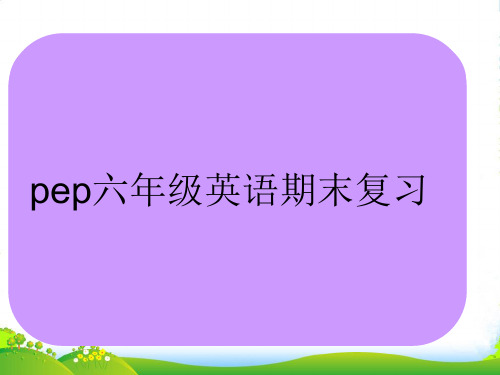
1、What are you going to do?你想做什么?询问他人在未来的 打算。be going to 后面要跟动词的原形。注意be going to be 意思是 “打算成为什么,干什么职业。” 注意一下句子的区别,找出正确回答。 What are you going to do this afternoon? I am going to 加 做事的词组
pep六年级英语期末复习
重点词汇 science museum post office bookstore cinema hospital crossing turn left go straight turn right 重点句型 Where is the museum shop?
It’s near the door.
3 We’re going to draw some pictures in Renmin Park. 我们要到人民公园去画画。 4、 I’m going to see a film. 我打算去看电影。
5、 I’m going to visit my grandparents. 我打算去看望外 祖父母。
How are you going?I am going to 加交通方式的词组
Who are you going with? I am going to 加某人
部分疑问代词的意义与用法:
(1)What 什么。用来问是什么,做什么,叫什么,什么样等 等。如:What is your name? 你的名字叫什么? What is your father? 你爸爸是干什么的? What is your hobby?你的爱好是什么?What is your favourite food?你最喜爱的食物是什么? What’s your math teacher like? 你的数学老师长得什么样子? (2)Where , 在哪里,到哪里。用来问地点。
人教版(PEP)六年级英语上册期末复习知识点

人教版(PEP)六年级英语上册期末复习知识点人教版(PEP)六年级英语上册复习知识点Unit 1 How can I get there?主要单词:science科学museum博物馆post office邮局bookstore书店cinema电影院hospital医院crossing十字路口turn转弯left 向左ask问interesting有趣的Italian意大利restaurant餐馆pizza 比萨饼street大街;街道get到达GPS全球卫星定位系统feature特点follow跟着far较远的tell告诉习惯搭配turn left向左转turn right向右转go straight直行in front of...在...前面next to挨着go straight直走near the park在公园附近on Dongfang Street在东方大街上post office邮局pet hospital 宠物医院Beihai Park北海公园Italian restaurant意大利餐馆Palace Museum故宫博物院science museum科学博物馆主要句子:☆1、☆Where is the museum shop?博物馆的市肆在哪儿?☆☆2、It’s near the door.在大门附近。
☆☆3、How can we get there?我们怎么到那儿?☆☆4、Turn left at the bookstore.在书店左转。
☆5、I want to buy a postcard.我想买一张明片。
6、I’ll ask.我去问问。
7、Wow, a talking robot!哇!一个讲话机器人。
8、What a great museum!好棒的一家博物馆!10、There is a pet hospital in my city.在我的城市有一家宠物医院。
11、Wu Yifan and Robin are looking at some robots.吴一凡和罗宾正在看一些机器人。
闽教版小学英语六年级上册期末总复习材料
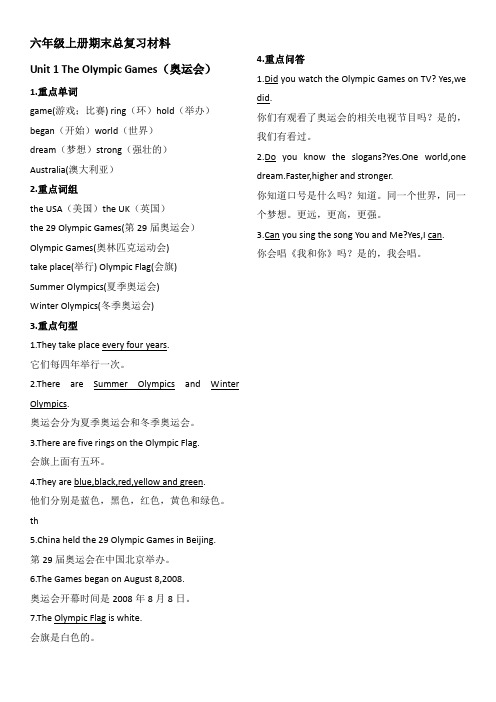
六年级上册期末总复习材料Unit 1 The Olympic Games(奥运会)1.重点单词game(游戏;比赛) ring(环)hold(举办)began(开始)world(世界)dream(梦想)strong(强壮的)Australia(澳大利亚)2.重点词组the USA(美国)the UK(英国)the 29 Olympic Games(第29届奥运会)Olympic Games(奥林匹克运动会)take place(举行) Olympic Flag(会旗)Summer Olympics(夏季奥运会)Winter Olympics(冬季奥运会)3.重点句型1.They take place every four years.它们每四年举行一次。
2.There are Summer Olympics and Winter Olympics.奥运会分为夏季奥运会和冬季奥运会。
3.There are five rings on the Olympic Flag.会旗上面有五环。
4.They are blue,black,red,yellow and green.他们分别是蓝色,黑色,红色,黄色和绿色。
th5.China held the 29 Olympic Games in Beijing.第29届奥运会在中国北京举办。
6.The Games began on August 8,2008.奥运会开幕时间是2008年8月8日。
7.The Olympic Flag is white.会旗是白色的。
4.重点问答1.Did you watch the Olympic Games on TV? Yes,we did.你们有观看了奥运会的相关电视节目吗?是的,我们有看过。
2.Do you know the slogans?Yes.One world,one dream.Faster,higher and stronger.你知道口号是什么吗?知道。
人教(PEP)六年级上册英语期末复习(共23张PPT)
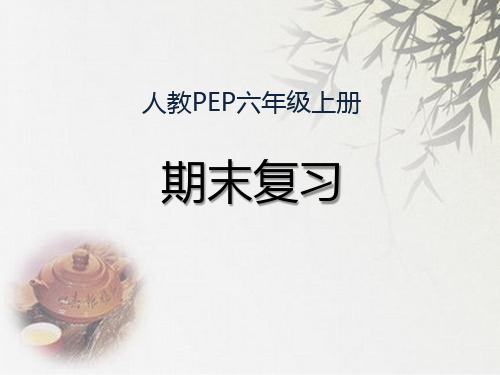
A. a, of
B. an, in
C. an, from
(C) 3. —Does Zhang Peng like dancing?
— _________ He likes playing basketball.
A. Yes, he can.
B. Yes, he does. C. No, he doesn’t.
factory worker
businessman
postman
police officer
Review
Unit5
Where does he/she work? How does he/she go to work?
fisherman
pilot
scientist
coach
Review
Unit5
( A ) 1. My mother works in a factory. She is a ________.
—This morning. A. Where
B. What
C. When 答案
Review
Unit4
—What are your hobbies? —I like …
Review
Unit4
—Does he/she …?
—Yes, he/she does./No, he/she doesn’t.
A. worker
B. watch
C. dancer
( A ) 2. He catches fish. He is a ________.
A. fisherman
B. teacher
C. fishermen
( B ) 3. —What do you do? —________
六年级英语上册期末复习资料
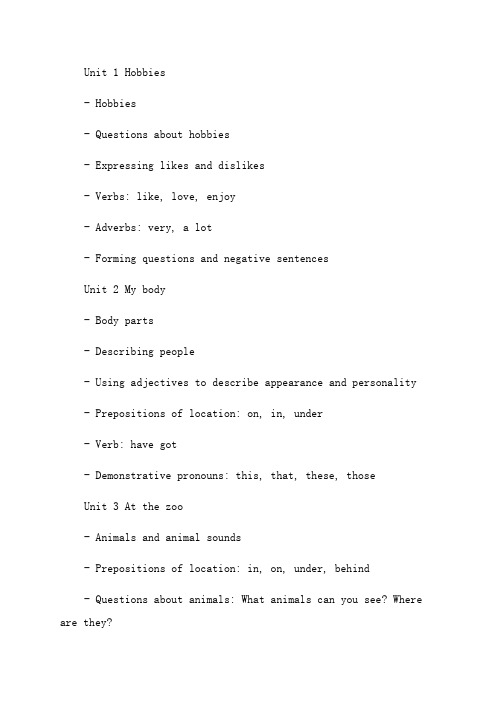
Unit 1 Hobbies- Hobbies- Questions about hobbies- Expressing likes and dislikes- Verbs: like, love, enjoy- Adverbs: very, a lot- Forming questions and negative sentencesUnit 2 My body- Body parts- Describing people- Using adjectives to describe appearance and personality - Prepositions of location: on, in, under- Verb: have got- Demonstrative pronouns: this, that, these, thoseUnit 3 At the zoo- Animals and animal sounds- Prepositions of location: in, on, under, behind- Questions about animals: What animals can you see? Where are they?- Adjectives: big, small, tall, short, long, thin, fat- Singular and plural nouns- Affirmative and negative sentencesUnit 4 At school- School subjects- Classroom objects- Actions: read, write, draw, play, sing, dance, swim, run - Expressing ability: Can you…? Yes, I can. / No, I can’t.- Expressing permission: Can I…? Yes, you can. / No, you can’t.- Ordinal numbers: first, second, third, etc.Unit 5 My house- Rooms in a house- Furniture and household objects- Prepositions of location: in, on, under, behind, next to, in front of- Questions about rooms and furniture: Is there a…? Are there any…?- There is / There are- Adjectives: big, small, old, new, clean, dirtyUnit 6 At the park- Activities at the park: walk, run, play, ride, climb, swing, slide- Prepositions of location: in, on, under, behind, in front of, next to- Questions about activities: What can you do at the park? Where can you…?- Expressing preferences: I prefer… / I don’t like…Unit 7 In the mountains- Geographical features: mountain, river, lake, valley- Activities in the mountains: hike, climb, swim, fish, take photos- Prepositions of location: in, on, under, behind, in front of, next to- Questions about activities: What can you do in the mountains? Where can you…?- Verb: can- Expressing preferences: I prefer… / I don’t like…Unit 8 In Beijing- Places in Beijing: the Great Wall, the Forbidden City, Tiananmen Square- Activities in Beijing: visit, walk, take photos, climb, buy souvenirs- Prepositions of location: in, on, under, behind, in front of, next to- Questions about places and activities: What can you do in Beijing? Where can you…?- Modal verb: can- Expressing preferences: I prefer… / I don’t like…Unit 9 Food and drinks- Food and drinks- Expressing likes and dislikes about food and drinks- Countable and uncountable nouns- Quantifiers: a glass of, a cup of, a bowl of, some- Adjectives: hot, cold, sweet, salty, sour, delicious, tastyUnit 10 Favourite sports- Sport names- Expressing likes and dislikes about sports- Sports equipment- Questions about sports: What sports do you like? What sports can you play?- Verbs: play, do- Expressing abilities: I can… / I can’t…Unit 11 Time for fun- Months and seasons- Expressing likes and dislikes about activities in different seasons- Ordinal numbers: first, second, third, etc.- Adjectives: sunny, cloudy, rainy, snowy, cold, hot, warm, cool- Present simple tense: I read/write/draw…Unit 12 Holidays- Holidays and holiday activities- Questions about holidays: What holiday is in…? What can you do during…?- Adjectives: long, short, fun, boring, interesting- Expressing future plans: I am going to… I will…- Expressing preferences: I prefer… / I don’t like…总结:这个提纲包含了人教版六年级上册所有的重点内容,可以帮助学生复习整个上学期所学的知识点。
教育部审定小学英语六年级上册期末总复习材料抄写单词
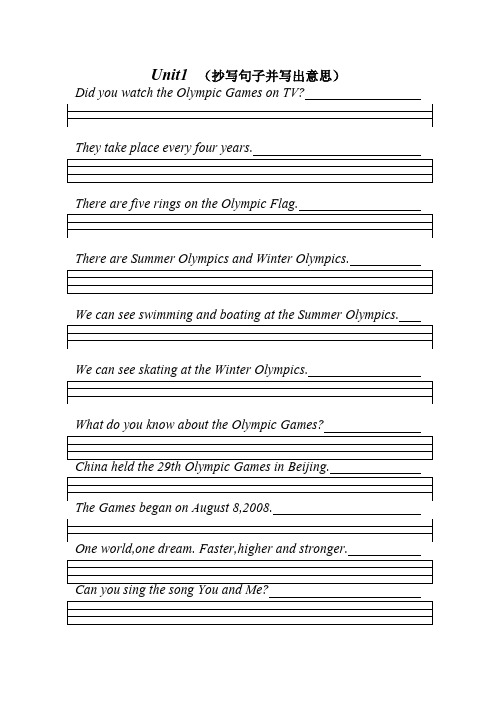
Did you watch the Olympic Games on TV?They take place every four years.There are five rings on the Olympic Flag.There are Summer Olympics and Winter Olympics.We can see swimming and boating at the Summer Olympics.We can see skating at the Winter Olympics.What do you know about the Olympic Games?China held the 29th Olympic Games in Beijing.The Games began on August 8,2008.One world,one dream. Faster,higher and stronger.Can you sing the song You and Me?Who’s that boy between the two women? He looks strong and healthy.Does he exercise every day?He always gets up early in the morning. Does he often play basketball?He always goes running in the morning. Does he often do high jump.Wang Tao is passing the ball to Peter. Some girls are cheering for their class team. Grandma is sitting between Ben and Sally. They are boating with their father.They are cheering for their class team.Do you often exercise?It’s bad for your teeth.m going to pick some vegetables.They keep your body healthy.Bring me a basket,please.Bring me a glass of water.m very thirsty.Take an umbrella with you.We need vegetables and fruits to keep healthy. What do you usually have for lunch?I usually have rice,fish and vegetables.Can I help you,madam?My daughter wants a dress.My son wants a pair of shorts.Can I try it on?She looks beautiful in her new dress.Girls can wear shorts,trousers,and T-shirts like boys.Boys can’t wear skirts or dresses like girls.Put them in the washing machine.s.t know.s.s.I make my bed every morning.I often water the flowers.I clean my room erery week.I clean the table after dinner.I wash my clothes.Wash my clothes water the flowers water the plantsHe usually gets up at half past six.He got up at half past seven.He usually walks to school.He usually gets to school at seven twenty.clock.At half past eleven. Why did you go to bed so late?I watched a football game on TV.What did you do last night?did some shopping at the supermarket.watched a film at the cinema.played the violin in my bedroom.watched a football game at home.What’s the date today?Can I invite my friends to dinner?It’s November 17.The fourth Thursday of November.How do you spend it?We have a big family dinner.We also invite friends to join us.Please help yourselves to the food.Would you like some soup,Miss Gao?Pass me the corn,please.March 12 Tree Planting DayOctober 1 National DaySeptember 10 Teachers’DayDecember 25 Christmas DayLook at the moon,Dad.Its light comes from the sun.Are there any people on the moon?肯定回答:否定回答:Are there any pupils in the playground?肯定回答:否定回答:Are there any trees on the moon?Is there a baby elephant in the zoo?肯定回答:否定回答:Is there a rabbit on the moon?They look small because they are far away from us.We see the moon and the stars at night.We see the sun in the day.The sun shines day and night.The earth goes around the sun.The moon doesn’t shine.Its light comes from the sun.。
六年级英语上册期末复习资料(人教版六年级上英语全册期末复习提纲)

am 只跟I放在一起be动词 is 主语是单数时用are 主语是复数时用Unit 1 询问一些地点在哪;怎样到达一些地点1.询问地点在哪:Where is the 地点Where is the cinema? 电影院在哪?回答: near(附近)next to(旁边)It’s behind(后面) the 地点in front of(前面)It’s near the zoo. 它在动物园附近。
2. 询问怎样到达一个地点:How can I get to the 地点How can I get there/ here ?How can I get to the cinema? 我怎样到达电影院?回答:turn leftturn right at the 地点 go straightTurn right at the zoo. 动物园右转。
Turn left at the zoo, and then go straight, the cinema is on your left.动物园左转然后直走,电影院在你的左边。
或:You can Take the No.57 bus. 你可以乘坐57路公交车。
人 can take the No.数字 busUnit2 到达一些地点的交通方式doesHow do you go to school? 你怎么去学校?回答:人 go(goes) to school by 交通工具I go to school on foot. She goes to school by bus.2.人 must 动词原形人必须……People on bikes must wear one. 骑自行车的人必须戴一个。
I must pay attention to the traffic lights. 我必须注意交通信号灯。
Unit3 人打算做事1.人 be going to do(动词原形) 人打算(或将要)去做事She is going to see a film. 她打算去看电影。
(必考题)小学英语六年级上册期末经典复习题(含答案解析)
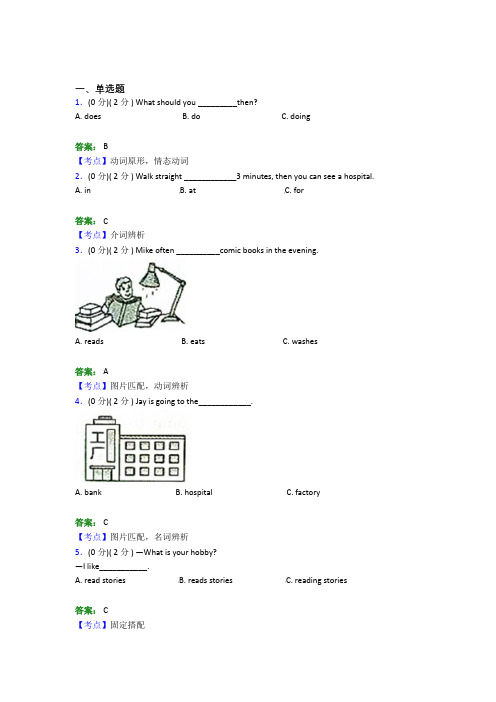
一、单选题1.(0分)( 2分 ) What should you _________then?A. doesB. doC. doing答案: B【考点】动词原形,情态动词2.(0分)( 2分 ) Walk straight ____________3 minutes, then you can see a hospital.A. inB. atC. for答案: C【考点】介词辨析3.(0分)( 2分 ) Mike often __________comic books in the evening.A. readsB. eatsC. washes答案: A【考点】图片匹配,动词辨析4.(0分)( 2分 ) Jay is going to the____________.A. bankB. hospitalC. factory答案: C【考点】图片匹配,名词辨析5.(0分)( 2分 ) —What is your hobby?—I like___________.A. read storiesB. reads storiesC. reading stories答案: C【考点】固定搭配6.(0分)( 2分 ) — ______ does your uncle do?— He's a worker.A. WhatB. WhereC. Which答案: A【考点】疑问词辨析7.(0分)( 2分 ) 你要问路,就要先对对方说:A. Excuse me.B. What can I do for you?答案: A【考点】情景交际8.(0分)( 2分 ) — What is Amy's hobby?— __________________A. I like drawing.B. She likes drawing.C. She lives in Canberra.答案: B【考点】情景交际二、选词填空9.(0分)( 5分 ) 选词填空see, take, wear, do, to(2)My mother is ill. She should ________ a doctor.(3)If you want to stay healthy, you should ________ more exercise.(4)Jim, can you count ________ten?(5)Mike, you should ________ warm clothes.答案:(1)take(2)see(3)do(4)to(5)wear【考点】选词填空10.(0分)( 1分 ) My uncle works ________ (at/in) sea.答案: at【考点】介词短语,介词辨析11.(0分)( 1分 ) My mother often ________ (go/goes) to bed at 9:30 pm.答案: goes【考点】一般现在时12.(0分)( 2分 ) (2020六上·婺城期末)Ben ________ (does/ doing) kung fu every evening. We often ________ (do/ does) kung fu together.答案: does;do【考点】一般现在时13.(0分)( 1分 ) (2020六上·婺城期末)I want ________ (to buy/buy) a postcard.答案: to buy【考点】固定搭配14.(0分)( 2分) (2020六上·婺城期末)—What ________ (do/does) Linda ________ (have/has)?— She has a cute dog.答案: does;have【考点】一般现在时,特殊疑问句15.(0分)( 5分 ) 从方框中选择适当的词语补全下列句子或对话。
译林版版小学六年级上册期末英语复习试卷(含答案)

译林版版小学六年级上册期末英语复习试卷(含答案)一、单项选择题1.It was windy yesterday. Did you _______ kites with your friends? ( )A.fly B.flew C.flies2.There is not much water. We should ______ water. ( )A.waste B.reuse C.make3.Reading in the sun is ________ your eyes. ( )A.good for B.bad for C.good at4.There _______ rubbish in the water and the fish _______ dead. ( )A.is; are B.are; is C.am; is D.are; are 5.That sign ________ mean "No littering". ( )A.isn’t B.doesn’t C.don’t6.Mr. Craven thought the garden would be _____. ( )A.alive B.dead C.green7.We are all very _______ about the _______ news. ( )A.excited; exciting B.exciting; excited C.excited; excited D.exciting; exciting 8.It ______ cloudy in the morning. But it ______ sunny now. ( )A.is; is B.was; is C.was; was9.The sign on the door says “Danger”. We shouldn’t _______. ( )A.go in B.drink C.talk10.It's sometimes ________ in summer there. It ________ yesterday. ( )A.rainy; rained B.rainy; rains C.rains; rainy11.I like ______ in the city. Would you like ______ in the city? ( )A.living; to live B.living; living C.to live; living 12.Look! The men ______. ( )A.smoke B.smokes C.are smoking13.________ the Earth, we can save water. ( )A.To protect B.Protect C.Protecting14.It was ______ last Monday and it ______ all day. ( )A.raining; rainy B.rained; raining C.rainy; rained 15.Yang Ling got an email _______ her e-friend yesterday. ( )A.in B.to C.from二、用单词适当形式填空16.Smoke from cars _______ (make) our city dirty.17.There are many _______ (factory) in Xuzhou.18.My family and I _______ (buy) some new clothes tomorrow.19.They’re going to _______ (watch) a lion dance next morning.20.We ______ (make) cakes tomorrow.21.________ (save) water, we can _________ (reuse) water ________ (water) trees.22.I can reuse the plastic bottle ______ (make) a toy.23.We can move some ______ (factory) away from our city.2lack smoke from ______ (factory) makes the air dirty.25.What ______ (do) the sign mean?26.We ________ (have) a party in the classroom tomorrow.27.We should ______ (reuse) paper ______ (make) paper flowers.28.The sign over there ______ (mean) "No ______ (smoke)".29.__________ (they) bodies are too hard. Please don’t hit __________ (they).30.Yu Gong and his family __________ (work) very hard. They __________ (be) tired but happy.三、完成句子31.My sister likes ________ (收集) old toys to make some new things.32.My grandpa r_________ newspapers and listened to the radio for news before.3oal and ______ are useful energy. We should save them.34.We shouldn’t use too much plastic, we should use g_______ bottles.35.There are many dogs _______ (在……周围) us, we are afraid of them.36.Put on this pair of gloves. They will ______ your hands warm(让你的手保持暖和).37.It _______ (变成) very hot last week.38.Chinese New Year is the most i_______ festival in China.39.Children are very e_______ on Children's Day.40.It is _____ (有风的), we can fly kites high in the sky.四、完形填空Do you know Chinese New Year? It is an _41__ festival in China. It usually comes _42__ January or February. We also call it Spring Festival. We often _43__ houses and buy a lot of food before the festival.During this festival, we get together with family. We wear new _44__ cook delicious food and_45__ friends. Children can get lucky money. In England, the most important festival is _46__. It's on _47__ 25th. People decorate a Christmas tree, _48__ gifts, write Christmas cards, play Christmas music and have a Christmas party. They have a two-week _49__.What's your _50__ festival?41、A.happy B.important C.good D.nice42、A.in B.on C.at D.for43、A.collect B.draw C.clean D.make44、A.raincoat B.exercise C.games D.clothes45、A.visits B.visit C.visiting D.visited46、A.Christmas B.Thanksgiving C.Halloween D.National Day47、A.September B.October C.November D.December48、A.cook B.play C.buy D.look49、A.vacation B.vacations C.vacation's D.vacations'50、A.old B.many C.like D.favorite五、阅读判断It is Sunday today. My parents, my brother Tom and I are all at home. My father is washing his car. He is going to Beijing tomorrow. He is going there by car. My mother is putting the flowers under the sun. Then she is going to buy some flower seeds. Tom is drawing a picture. There are many clouds in his picture. I am very busy. I’m doing my homework.41、Today is Sunday. ( )42、Tom’s father is going to Beijing on Saturday. ( )43、Tom’s father is going to Beijing by car. ( )44、Tom’s mother is buying some flowers seeds now. ( )45、Tom’s doing housework. ( )六、阅读理解This term I came to NO. 8 Middle school. It is very beautiful and big. There are 34 classes, 120 teachers and 1800 students in the school.In the middle of the school there is a tall building. It's for us to have classes. All the classrooms are there. There are some small rooms, too. They are offices for the teachers to work. All the teachers get ready for their lessons there.In front of the tall building, there is a small one. It is the library. There are many books there. The teachers and the students like to read books in it. Sometimes they borrow books from it.There is a dinning hall behind the tall building. Some of the students have lunch in it.I like my new school very much.51、There are _______ classes in No. 8 Middle school. ( )A.36 B.34 C.3552、The classroom is in _________. ( )A.a tall building B.a library C.an office53、Where is the library? ( )A.Behind the tall building.B.Next to the tall building.C.In front of the tall building.54、How many students are there in my school? ( )A.120. B.1600. C.1800.55、Which sentence(句子) is true? ( )A.Behind the school there is a tall building.B.There is a dinning hall in the middle of the tall building.C.All the teachers get ready for their lessons in some small rooms in the tall building.七、选择题There are some easy things you can do to protect the environment.● Plant flowers, grass and trees.● Whenever(无论何时) you visit a park or a beach, take away all of your things you bring there—keep a rubbish bag.● Turn off(关) the lights, TVs when you leave the room.● Turn off the tap(水龙头) after you brush your teeth. You can save some water.● Keep the doors and windows closed in winter to keep warm.● Use less(少) things that can be used only once(一次). For example, use glass cups instead of paper cups.● Give your old clothes to children who needs.56、The article(文章) is ________. ( )A.a sign B.a story C.a proposal(提议)57、________ is good for the environment. ( )A.Keeping a rubbish bag when you are in the park B.Giving your new clothes to others C.Turning on the tap after you brush your teeth58、We can ________ to save paper. ( )A.turn off the lights B.use glass cups C.keep the window closed59、Which is WRONG? ( )A.Litter in the park when you leave away. B.Turn off the lights when you leave the room. C.Close the doors to keep warm in winter.60、The main idea of this article is how to ________. ( )A.use less things B.save water C.protect the environment 八、选择题4Alice is my new friend. She lives in Australia. She is twelve. Her father works in a school. He is a teacher. He goes to work by bus. He likes playing football. Her mother is a nurse. She walks to the hospital because their home is near. Alice and her sister Ann are twins. They look the same but they have different hobbies. Alice likes watching cartoons. Her sister loves doing word puzzles. They share one room with two beds.I write an email to Alice every week. Alice says her family are going to China soon. Alice is going to visit me and bring me a gift. I am very happy to hear that. She will also buy me a science book, because I want to be a scientist one day.61、Alice's father is a ______. ( )A.doctor B.teacher C.pilot62、How does Alice's mother go to work? ( )A.By bus. B.By car. C.On foot.63、How old is Ann? ( )A.11、B.12、C.13、64、What does Ann like? ( )A.Playing football. B.Watching cartoons. C.Doing word puzzles.65、How often do I write to Alice? ( )A.Once a week. B.Twice a week. C.Once two weeks.九、选择题4It is March 12、 It's Tree Planting Day. There are many people on the hills. They’ re planting trees.People plant many trees today. Plants are important to us. They can make food from the air, water and sunlight. But animals and people can’t do so. Animals and people can get food from plants. Without plants, life will not go on. Plants make the air Clean. They can keep water from flowing away(流失). They can stop wind from blowing plant more trees and grow more plants. They will try to protect the trees, about floods up sand and earth.But in some places people are cutting down too many trees. This brings about floods and sandstorm. Now more and more people know that plants are important. They will plant more trees and grow more plants. They will try to protect the trees.66、Trees planting Day is on _______. ( )A.the twentieth of March B.the twelfth of March C.March13th67、_______ can make food from the air, water and sunlight. ( )A.People B.Animals C.Plants68、Life needs _______ to go on. ( )A.food from plants B.animals C.sand69、What can plants do? ( )A.They can make the air clean and stop the wind.B.They can keep the water from flowing away.C.Both A and B.70、_______ will try to protect the plants ( )A.Some people B.More and more people C.No people【参考答案】一、单项选择题解析:A【详解】句意:昨天有风。
六年级上册英语期末复习
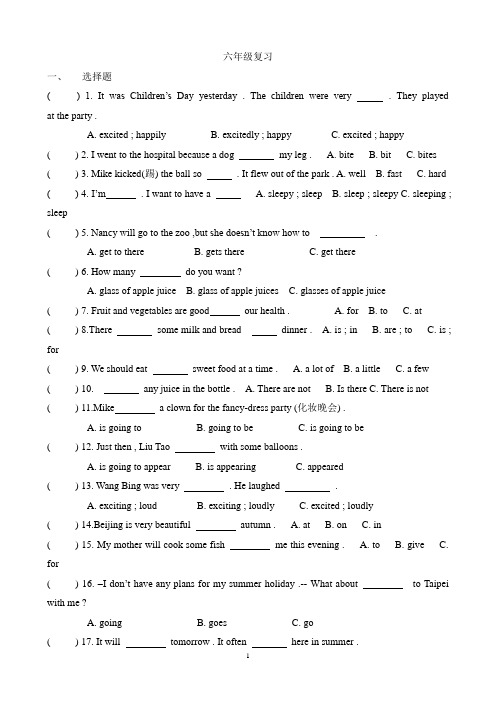
六年级复习一、选择题( ) 1. It was Children’s Day yesterday . The children were very . They played at the party .A. excited ; happilyB. excitedly ; happyC. excited ; happy( ) 2. I went to the hospital because a dog my leg . A. bite B. bit C. bites ( ) 3. Mike kicked(踢) the ball so . It flew out of the park . A. well B. fast C. hard ( ) 4. I’m. I want to have a A. sleepy ; sleep B. sleep ; sleepy C. sleeping ; sleep( ) 5. Nancy will go to the zoo ,but she doesn’t know how to .A. get to thereB. gets thereC. get there( ) 6. How many do you want ?A. glass of apple juiceB. glass of apple juicesC. glasses of apple juice( ) 7. Fruit and vegetables are good our health . A. for B. to C. at ( ) 8.There some milk and bread dinner . A. is ; in B. are ; to C. is ; for( ) 9. We should eat sweet food at a time . A. a lot of B. a little C. a few ( ) 10. any juice in the bottle . A. There are not B. Is there C. There is not ( ) 11.Mike a clown for the fancy-dress party (化妆晚会) .A. is going toB. going to beC. is going to be( ) 12. Just then , Liu Tao with some balloons .A. is going to appearB. is appearingC. appeared( ) 13. Wang Bing was very . He laughed .A. exciting ; loudB. exciting ; loudlyC. excited ; loudly( ) 14.Beijing is very beautiful autumn . A. at B. on C. in( ) 15. My mother will cook some fish me this evening . A. to B. give C. for( ) 16. –I don’t have an y plans for my summer holiday .-- What about to Taipei with me ?A. goingB. goesC. go( ) 17. It will tomorrow . It often here in summer .A. rainy ; rainB. rain ; rainingC. rain ; rains( ) 18. Thank you for to me . A. write B. writing C. to write( ) 19. They are making plans the New Year party. A. at B. with C. for( ) 20. There a fashion show at school next Friday. A. are B. will be C. will ( ) 21. A diet is good for your . A. healthy; healthy B. healthy; health C. health ; healthy( ) 22. Su Hai’s grandmother Kitty’s cat .A. takes care ofB. take care ofC. takes care( ) 23.There a pair of shoes and some balls under the bed just now . A. were B. is C. was( ) 24.The boys are talking about the football match .A. excitedB. excitingC. excitedly( ) 25. it often in Jiangsu? A. Does; rainy B. Is; rainy C. Was , rainy( ) 26. Don’t eat sweet food. That’s bad for our teeth.A. too manyB. much tooC. too much( )27.“How can I go home?” asked the girl . A. loud B. sadly C. sad( )28.The children watched an football match.They were all very .A. exciting, excitingB. excited, excitingC.exciting, excited( )29. our city clean, we should do our best. A. Keep B. Keeps C.To keep( )30.Let the worker a hole in the ground. A. make B. made C. makes( )32. games people happy. A. To play, make B. Playing, make C. Playing, makes( ) 33.---What do you do _____ Chinese New Year’s Eve?--- We usually _____ a big dinner with our family.A. on, have B on, are going to have C. in, had( ) 34. All the children are _______ the party. A .exciting with B excited about C. exciting about()35. Trees help__________ the air clean. A. keep B. to keeping C. keeping ()36. There_____ rubbish in the water and the fish ______dead.A. is; areB. are; isC. are, are( ) 37. The ball is the hole, so Sam pours some water the hole. A. in, in B. into, in C. in, into( )38. Can you tell us how __________ the bus stop. A. to get B. get C. to get to( )39.The man walks , but the woman walks . A.fast, slow B.fast, slowlyC. fastly, slowly( )40.Liu Tao plays basketball ,but Mike does .A. bad, good B. badly, good C. badly, well二、用词的适当形式填空1. Butterflies are ________ (beautiful). They like dancing ____________(beautiful).2.How about (fly) a kite this afternoon?3.Lucy (catch) a bird with her father yesterday morning.4. Su Yang (go) to Japan next Monday . She (want) (find) some information aboutthis country .5. It is a (wind) day . We (fly) kites in the park now .6. It often (rain) here in spring .7. Su Hai is good at (sing) .8. (swim) is good for us . It (make) people (health) and strong .9. Tim knows how to cross the street (safe).10. You mustn’t play on the road . It’s not (safe) .11. Miss Li is talking about traffic (safe).12. Why is the bus (stop) again ?13. Ben is a (happy) boy . He always feels ____ (happy)every day . He always laughs (happy) .14. I _________ ( give ) it to Bob yesterday afternoon.15. ______ you _____ (finish) your homework yesterday?16. All the students are very (excite).17. The mouse is saying (quiet) to the lion.18. Liu Tao (have) some (well) (habit) and he (do) (good) at home.20. Liu Tao_________ (finish) his homework late every day.21. The mouse helped the lion (get) out from the net .22. Don’t shout. Your grandpa (read) newspapers in the study23. Fruit and vegetables are (health) food.24. It’s not ________ (safety) to cross the road now.25. To cross the road ________ (safe), we must look for a zebra ________ (cross).26. To keep ________ (safely), you mustn’t run ________ (quick) on the road.27. It’s too ________ (easily). I can work it out ________ (easy).28. Many __________ (child) run on the playground every day.29. They’re all ________ (drive), they _______ (driver) ________( good).30. Last Sunday, my dad (take) my brother to the KFC, he (become) (happy)31. The boy behind me is _________ (write ) a letter.32. Would you like _________ (listen ) to some music ?33. Look , he can ________ (fly ) a kite on the grass.34. _________ your cousin always like _______ (ask ) a lot about Maths?35. My brother often ________ (play ) football at the weekend.36. I _______ (finish) primary school next year.37. Rubbish _________(make ) the water dirty .38. It’s time _________ (have ) lunch.39. There ________(be) three_______(box) on the table just now.40. Listen! The girl __(play) the piano. She__(play) it every afternoon. But she _ (not play) it yesterday afternoon.41. __________(they)classroom is very messy. 42. We’re going to __________(make) cakes tomorrow.43. Miss Li__________(buy) some flowers last Sunday. 44. We _________(should)throw rubbish anywhere.45. She ________(clean)the desks and _________(put)the rubbish in the bin just now.46..I like . I’d like (swim) with Tim after school.47.The jacket fits me (good). 48. Where’s your mother? She ____________(cut) out a dress.49. My mother often tells me ____________ (not watch) too much TV.50. We should practice ____________ (speak) English more.51. Are you busy __________ (plan) the class trip?52. It takes me about half an hour __________ (run) every day.53. This pair of trousers _________ (look) very nice.54. My cousin with his parents _________ (begin) to eat lunch at 11:30am.55. How long does your mother spends fifteen minutes _________ (walk) to school every morning?56. I have fun __________ (study) English. 57. It’s fun __________ (read) comic books.三、按要求完成句子1. Finally, the lion let the mouse go.(改否定句)2. The woman caught the fish with a net.(对划线部分提问)3. Wang Bing always gets up late.(写同义句)4. Tim eats a lot of sweets every day.(对划线部分提问)5. We usually finish our homework before dinner.(用she 替换we 改写句子)6. A monkey woke the tiger up.(改成一般疑问句)7. Sam brings some water quickly.(改成否定句)8. There are some oranges in the basket.(改成一般疑问句,并作否定回答)9. Jack usually has a few cakes for breakfast.(对画线部分提问)e with me.(改否定句)11.There is much milk in the bottle.(对划线部分提问)12. He has a lot of potatoes. (改一般疑问句,作肯定回答)13. Sometimes he watches TV too.(改同义句)14. Tim has five apples every week.(对划线部分提问)15. They must walk fast now.(改写成否定句)16. We must do your homework before dinner. (对划线部分提问)17. She usually takes some food to the classroom. (用yesterday替换often 改写句子)18. He must not watch TV at night,(提问)19. Helen can play the piano well too. (同义句)20.Does Yang Ling have any good habits?(改为陈述句)21. Where did you visit ? (改为同义句)22. Ben saw some public signs in the restaurant . (改为一般疑问句)23. She had an Art lesson this morning .( 用tomorrow morning 改写句子)24. I was in the playground just now .(改为一般疑问句)25. This sign means “No littering”.(对划线部分提问)26.Liu Tao visited his uncle last week .(对划线部分提问)27. Smoke makes the air dirty. (对划线部分提问)28. Tom takes the metro to his factory every day. (改为同义句)29. He went to the supermarket just now. (否定句)30. They are going to make tangyuan.(对划线部分提问)四、翻译(每空不限词数)1.我们用木头做床、椅子和许多其它东西。
六年级英语上册期末知识点综合复习难点知识习题

六年级英语上册期末知识点综合复习难点知识习题班级:_____________ 姓名:_____________【单词拼写】1. 改变下列单词的首字母,使之变为另一个单词,并组词组。
[1]book—— ________ _______________[2]give——________ _______________[3]come ——________ _______________[4]game——________ _______________[5]luck——________ ________________2. 按要求写单词。
1. eat(过去分词)2. quick (副词)3. have(现在分词)4. care(形容词)5. Saturday(缩写)6. be careful(英译汉)7. 另一个的(汉译英)8. made(原形)3. 根据提示写出句子所缺的单词。
Model:It comes from the water in the river.1. What c____ you see in the picture?2. Where d____ the rain come from?3. How d____ you do that?4. I''m going to p____ some flowers tomorrow.5. Nice to m____ you.4. 按要求写单词。
1. child (复数) ____________2. teachers (名词所有格)____________3. good (副词) ____________4. they (物主代词)_____________5. write (同音词)____________6. Canada (缩写形式)__ _________7. America (形容词)____________ 8. cheap (反义词)______________9. teach (第三人称) ____________ 10. bad (比较级)_______________5. 单词拼写(词汇运用)。
六年级英语上册期末综合复习卷人教(PEP)版 含答案
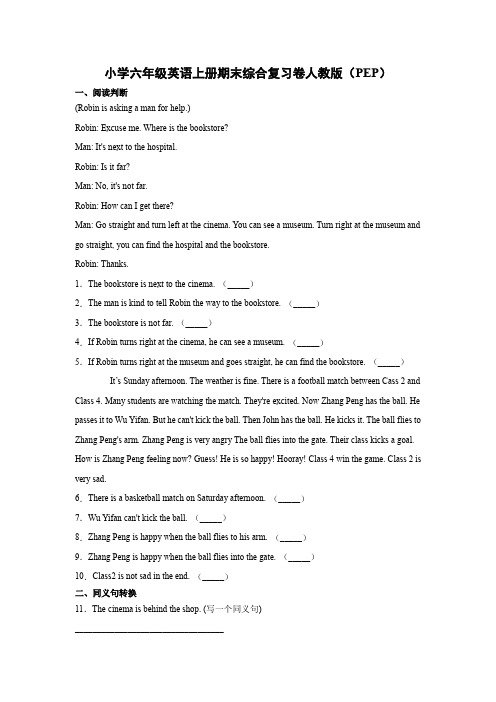
小学六年级英语上册期末综合复习卷人教版(PEP)一、阅读判断(Robin is asking a man for help.)Robin: Excuse me. Where is the bookstore?Man: It's next to the hospital.Robin: Is it far?Man: No, it's not far.Robin: How can I get there?Man: Go straight and turn left at the cinema. You can see a museum. Turn right at the museum and go straight, you can find the hospital and the bookstore.Robin: Thanks.1.The bookstore is next to the cinema. (_____)2.The man is kind to tell Robin the way to the bookstore. (_____)3.The bookstore is not far. (_____)4.If Robin turns right at the cinema, he can see a museum. (_____)5.If Robin turns right at the museum and goes straight, he can find the bookstore. (_____)It’s Sunday afternoon. The weather is fine. There is a football match between Cass 2 and Class 4. Many students are watching the match. They're excited. Now Zhang Peng has the ball. He passes it to Wu Yifan. But he can't kick the ball. Then John has the ball. He kicks it. The ball flies to Zhang Peng's arm. Zhang Peng is very angry The ball flies into the gate. Their class kicks a goal. How is Zhang Peng feeling now? Guess! He is so happy! Hooray! Class 4 win the game. Class 2 is very sad.6.There is a basketball match on Saturday afternoon. (_____)7.Wu Yifan can't kick the ball. (_____)8.Zhang Peng is happy when the ball flies to his arm. (_____)9.Zhang Peng is happy when the ball flies into the gate. (_____)10.Class2 is not sad in the end. (_____)二、同义句转换11.The cinema is behind the shop. (写一个同义句)__________________________________12.I go to the museum by car. (写出同义句)_____________________________________13.She will visit her grandparents. (同义句)____________________________三、任务型阅读(It's Friday afternoon. Tom and Jack are talking in the classroom.)Tom: Let's go to the library tomorrow!Jack: OK! Is it far?Tom: No, it's near my home. We can go there by bike. I have two new bikes. Jack: OK! First, I go to your home. Then we go there together.Tom: How do you come to my home?Jack: I can take the No. 10 bus to your home.Tom: OK! See you tomorrow.Jack: See you!14.Tom and Jack want to go to the ________.15.They want to go there on ________.16.They want to go there by ________.17.The library is ________ Tom's home.18.Jack can take the No. ________ bus to Tom's home.19.根据对话连线。
六年级上册期末英语综合复习
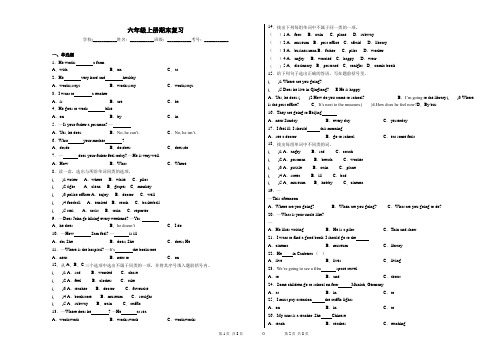
六年级上册期末复习学校:___________姓名:___________班级:___________考号:___________一、单选题1.He works a farm.A.with B.on C.at2.He very hard and healthy.A.works;stays B.works;stay C.work;stays3.I want to a teacher.A.is B.are C.be4.He goes to work bike.A.on B.by C.in5.—Is your father a postman? —A.Yes, he does. B.No, he can’t.C.No, he isn’t.6.What your mother ?A.do;do B.do;does C.does;do7.—does your father feel today? —He is very well.A.How B.What C.Where8.读一读,选出与所给单词同类的选项。
( )1.writer A.where B.white C.pilot( )2.tiger A.clean B.grapes C.monkey( )3.police officer A.enjoy B.doctor C.well( )4.football A.excited B.teach C.basketball( )5.taxi A.artist B.train C.reporter9.—Does John go hiking every weekend? —Yes, .A.he does B.he doesn’t C.I do10.—How Sam feel? —is ill.A.do; She B.does; She C.does; He11.—Where is the hospital? —It’s the bookstore.A.next B.next to C.on12.从A、B、C三个选项中选出不属于同类的一项,并将其序号填入题前括号内。
PEP六年级英语(上册)期末知识点总结

六年级上册英语复习知识点Unit1 HowcanIgetthere?一、主要单词:tasty 美味的LondonEye 伦敦眼stomach 胃gostraight=walkstraight 直走nextto 紧挨着/与⋯相邻farfrom(离⋯远)near 在⋯附近behind(在⋯后面)infrontof (在⋯前面)between⋯and⋯(在⋯和⋯之间)hot(反义词)cold cool( 反义词)warm too (同音词)to/twocannot(缩写)can’t right( 反义词)left/wrong buy( 同音词)by/byesea(同音词)see first (基数词)one four( 序数词)fourthdid( 原形)do/does three( 序数词)third give( 过去式)gave二、重点句型分析1、询问“某人或某物在哪里”的基本句型是:“Where+is/are+ 主语?”,whereis 后接名词或代词的单数形式,whereare 后接名词或代词的复数形式。
表示地点的词:museum博物馆,postoffice 邮局,bookstore 电影院,hospital 医院restaurant 餐馆bank银行busstop湖library图书馆zoo动物园school学校park公园garden馆书店,cinema公交车站lake花园hotel旅2. It’snearthedoor.此句中near是表示位置的介词,意为“旁边,附近”,其同义句是:It’s nexttothedoor. 它在门的旁边。
表示位置的短语:nexttothebookstore挨着书店nearthehospital 在医院附近nearthepostoffice 在邮局附近overthere在那边onDongfangStreet在东方大街上infrontoftheschool在学校前面3.Howcanwegetthere?此句用来询问“怎样去某地”,后面直接跟地点。
- 1、下载文档前请自行甄别文档内容的完整性,平台不提供额外的编辑、内容补充、找答案等附加服务。
- 2、"仅部分预览"的文档,不可在线预览部分如存在完整性等问题,可反馈申请退款(可完整预览的文档不适用该条件!)。
- 3、如文档侵犯您的权益,请联系客服反馈,我们会尽快为您处理(人工客服工作时间:9:00-18:30)。
六年级PEP上册知识点总结Unit 1 How can I get there?问路的重点句型:1.Where is the cinema, please? 请问电影院在哪儿?next to the bookstore 紧挨着书店in front of the school、在学校的前面、behind the park 在公园的后面It’s near the zoo、在动物园的附近、on D ongfang S treet 在东方大街上over there 在那边2、Excuse me, is there a cinema near here?请问这附近有电影院不?Yes, there is、/No, there isn’t、有、/没有。
There is a pet hospital in my city、我的城市里有一间宠物医院。
The library is in front of the school、图书馆在学校前面。
We are behind the hospital now、我们现在在医院后面。
I want to send the postcard today、我想今天去寄明信片。
He can help the boy find the Italian restaurant、她能帮助男孩找到意大利餐馆。
What a great museum! 多么了不起的博物馆!It’s next to the park on Dongfang Street、它在东方街公园附近。
3、How can I get to the hospital? 我该怎样到达医院呢?How can I / we get there?我/ 我们怎样到那?回答Turn right/ left at the … 在… 地方向右/ 左转、或Go straight 向前直走、或You can take the No、31 bus、您可乘坐31路公交车去。
4、Is it far from here? 它离这儿远不?Yes, it is、/ No, it isn’t、就是的,很远。
/ 不,不远。
Unit 2 Ways to go to school重点句型①询问交通方式用疑问代词how⏹——How do you go/come to school ? 您怎样去/来上学?—— I go/come to school on foot、我走路去/来上学。
⏹—— How does your father go to work ? 您父亲怎样去上班?——He goes to work by subway、她坐地铁去上班。
②询问地点,用疑问代词whereWhere is your home ? 您家在哪里?It’s near the post office 、在邮局旁边。
Where are the teachers ? 老师们在哪儿They are in the teacher’s office 、在老师的办公室。
③问路:How can I get to the F uxing H ospital? 我怎么去福星医院?You can take the No 、1 bus 、您可以乘坐1路公交车。
④交通规则(traffic rules ):Stop and wait at a red light 、红灯停Go at a green light 、绿灯行Slow down and stop at a yellow light 、黄灯停⑤You must drive slowly、You must wear a life jacket、您必须开慢点。
您必须穿救生衣。
You must stop at a red light您必须在红灯时停。
Don’t go at a red light、Don’t run on the ferr y、不要在红灯时走。
不要在轮渡上奔跑。
Don’t let the dogs run too fast、不要让狗跑的太快。
Unit 3 My weekend plan一、本单元中出现的一个重点语法就是一般将来时:表示将要发生的动作或状态,常与表示将来的时间连用。
构成: 陈述肯定句: 主语+ be going to +动词原形+ 其她例子: I am going to (go to)the bookstore by bus this afternoon、He/ She is going to take a trip by train this weekend、We/ They are going to see a film tonight、否定句: 主语+ be + not going to +动词原形+其她例子:I am not going to (go to)the bookstore by bus this afternoon、He/ She is not going to take a trip by train this weekend、We/ They are not going to see a film tonight、一般疑问句: Be+ 主语+ going to+动词原形+其她?例子: Are you going to the bookstore by bus this afternoon? Yes,I am 、No, I’m not、Is he/ She going to take a trip by train this weekend?Yes, he/ She is、No, he/ She isn’t、Are we/ they going to see a film tonight? Yes, we/ they are、No, we/ they aren’t、特殊疑问句: 特殊疑问词+ 一般疑问句?例子:What are you going to do this afternoon?Where are you go ing this afternoon?How are you going to the bookstore this afternoon?When are you going to the bookstore by bus?(以上特殊疑问句中are you 可以替换为is he , is she, are they, are we等)二、重点句型:1、We’re going to see a film about space travel! 我们将要去瞧关于火星之旅的电影。
2、We are going to draw some pictures in Renmin Park、我们打算去人民公园画一些画。
3、---Have a good time!玩的愉快。
---Thank you、/ Thanks、4、----What are you going to do in the future? 您将来想干什么?----I’m going to be a science teacher one day、或I want to be a science teacher one day、我想将来有一天当科学老师。
Unit 4 I have a pen pal本单元的重点就是谈论某人的兴趣爱好,语法就是动词的-ing形式与动词的第三人称单数形式。
一、词汇: dance (dancing) 跳舞sing (singing ) 唱歌hobb y play football (playing football) 踢足球(爱好) read story (reading stories ) 瞧故事hobb ies do kung fu (doing kung fu ) 练武术第三人单数第三人单数live (live s) in Shiyan 住在十堰like (like s) 喜欢teach (teach es) English 教英语study ( stud ies Chinese 学习汉语)go (go es) hiking 去远足cook (cook s ) Chinese food 制作中国食物) watch (watch es) TV 瞧电视read (read s) newspaper读报纸do (does) word puzzles 猜字谜二、句型:1. 询问某人的兴趣爱好:①----What’s your hobby?(单数句式) What are your hobbies?(复数句式)您的爱好就是什么?----I like reading stories and singing、我喜欢读故事书与唱歌。
I also like…我也喜欢…②---- What’s Peter’s (his) / Amy’s (her) hobby? (单数句式)What are Peter’s (his) / Amy’s (her) hobbies? (复数句式)---- He / She like s reading stories and singing、她/ 她喜欢读故事书与唱歌。
2、表示征求别人意见:Can I also be his pen pal? 我也可以做她的笔友不?Sure、当然。
三、语法用法:(1)表达喜欢做某事,通常要用动词的-ing形式, 即:like do ing sth、如:like sing ing / playing football / listening to music / playing the pipa / watching TV等(2)一般现在时的用法表示经常或习惯性的动作或状态,常与every day /morning /evening ,often, usually, always,sometimes 等状语连用。
如: We do morning exercises every day、He usually goes to school by bike、结构:肯定句:主语+动词+其她。
如: Miss white teaches English、否定句:主语+don’t/doesn’t +动词+其她如:Miss white doesn’t teach English、一般疑问句:Do/ Does +主语+动词原形+其她?如: Does Miss White teach English?肯否定回答:Yes,she does 、/ No, she doesn’t 、备注:第三人称单数用does, doesn’t、没有does,doesn’t 时动词必须要有变化。
